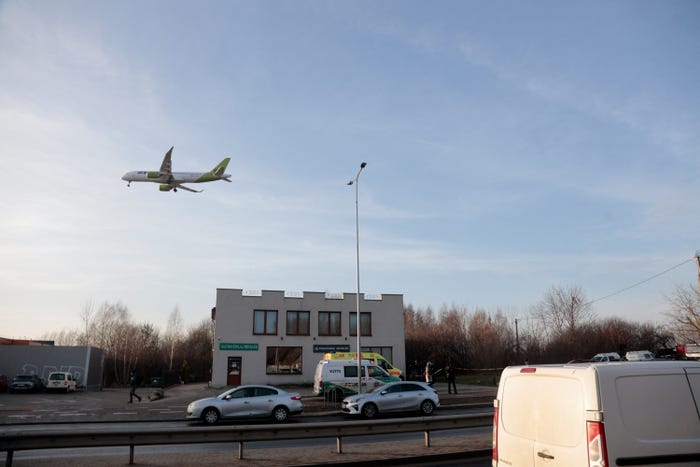Top Stories
Lithuania Closes Airports as Belarus Balloons Force Shutdowns

UPDATE: Lithuania has closed Vilnius Airport for the third consecutive night due to balloons entering its airspace from Belarus, authorities confirm. The closures are impacting approximately 47 flights from 9:42 p.m. to 4:30 a.m., highlighting an escalating air safety concern.
Officials reported that these helium-filled balloons are suspected to be linked to cigarette smuggling but pose significant risks to air traffic. Lithuanian Prime Minister Inga Ruginiene has unequivocally blamed the Belarusian government, led by Alexander Lukashenko, for allowing these balloons to “run wild.”
In a statement released on Sunday evening, officials explained that the decision to temporarily suspend airspace around Vilnius Airport was directly prompted by the presence of these balloons. “According to initial information, the decision regarding airspace restrictions was made due to balloons flying in the direction of Vilnius Airport,” the statement detailed.
This incident is part of a broader pattern, with Lithuania experiencing an influx of balloons from Belarus in recent weeks. The prime minister described a “large group of smuggling meteorological balloons” launched from Belarus, necessitating the closure of both Vilnius and Kaunas airports.
The situation escalated further as Lithuania announced plans to temporarily close its borders with Belarus. The Lithuanian Security Council is set to convene on Monday to discuss potential responses to the balloon incursions, a growing concern for the NATO member state.
Earlier this month, Lithuania reported that 250 balloons crossed into its territory in September alone, raising alarms about airspace violations and security threats. Local authorities indicated that this surge in balloon activity has been frequent, with officials discovering “several hundred markers” in just one night, suggesting a coordinated smuggling operation.
Authorities are urging technology companies and defense contractors to propose solutions for tracking and neutralizing these balloons, which are often equipped with GPS trackers and SIM cards to facilitate cargo tracking.
The urgency of the situation is amplified by recent reports of drone incursions over Poland and other NATO allies, prompting heightened vigilance across European airspace. Lithuania’s predicament echoes similar incidents in other regions, including South Korea, which accused North Korea of deploying balloons filled with refuse as a form of psychological warfare.
As the situation develops, officials continue to monitor the airspace closely, emphasizing the need for immediate action to protect air travel and national security. Sharing this urgent update is crucial as Lithuania grapples with these foreign incursions that threaten both safety and sovereignty.
-

 Science2 weeks ago
Science2 weeks agoIROS 2025 to Showcase Cutting-Edge Robotics Innovations in China
-

 Politics2 weeks ago
Politics2 weeks agoJudge Considers Dismissal of Chelsea Housing Case Citing AI Flaws
-

 World2 weeks ago
World2 weeks agoBravo Company Veterans Honored with Bronze Medals After 56 Years
-

 Top Stories2 weeks ago
Top Stories2 weeks agoIndonesia Suspends 27,000 Bank Accounts in Online Gambling Crackdown
-

 Lifestyle2 weeks ago
Lifestyle2 weeks agoStone Island’s Logo Worn by Extremists Sparks Brand Dilemma
-

 Sports2 weeks ago
Sports2 weeks agoMel Kiper Jr. Reveals Top 25 Prospects for 2026 NFL Draft
-

 Health2 weeks ago
Health2 weeks agoStartup Liberate Bio Secures $31 Million for Next-Gen Therapies
-

 Health2 weeks ago
Health2 weeks agoTop Hyaluronic Acid Serums for Radiant Skin in 2025
-

 World2 weeks ago
World2 weeks agoHoneywell Predicts Record Demand for Business Jets Over Next Decade
-

 Politics2 weeks ago
Politics2 weeks agoNew Jersey Voters Urged to Register Ahead of November Election
-

 Lifestyle2 weeks ago
Lifestyle2 weeks agoMary Morgan Jackson Crowned Little Miss National Peanut Festival 2025
-

 Sports2 weeks ago
Sports2 weeks agoYamamoto’s Mastery Leads Dodgers to 5-1 Victory in NLCS Game 2









